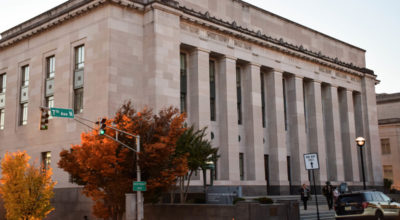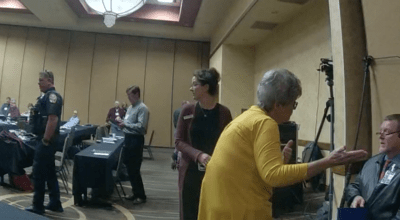
A national news organization with operations in Tennessee has filed a federal lawsuit against the director of Tennessee’s court administration, claiming the blanket closure of upcoming judicial conference meetings violates First Amendment rights of access.
By Deborah Fisher / Tennessee Coalition of Open Government
Dan McCaleb of The Center Square is asking a federal judge to enjoin the Tennessee Administrative Office of the Courts from blanket closure of the upcoming judicial conference in Nashville. He claims the closure policy violates the First Amendment right of access to judicial proceedings.
Dan McCaleb, the executive editor of Center Square, is asking the court to issue a temporary restraining order and preliminary injunction so that it can attend and cover the Tennessee Judicial Conference, which is expected to begin Wednesday. Center Square focuses on state and local government news and is staffed by reporters in several states, including in Tennessee.
On Nov. 6, 2021, David Tulis of the Tulis Report on 96.9 FM NoogaRadio in Chattanooga tried to attend a judicial conference in Middle Tennessee but was dragged out and charged with criminal trespass. The charge was later dropped.

“Freedom of the press is fundamental to our democracy and blocking reporters from covering judicial proceedings is illegal,” said Buck Dougherty, senior attorney at the Liberty Justice Center, which is representing McCaleb, in a press release. “It is in the interest of all Tennesseans that meetings where state court judges set rules, guidelines, and state court policies be open to the public and press. Drafting rules and policies behind closed doors on how citizens are governed in the courtroom violates the U.S. Constitution.”
U.S. District Judge Waverly Crenshaw, Jr., set a hearing on the temporary restraining order for Tuesday. He asked the state’s response to the motion for an injunction to “(a) discuss whether and to what extent annual meetings of the Tennessee Judicial Conference have historically been open to the public and the press and (b) discuss whether permitting video and/or audio access to annual meetings of the Tennessee Judicial Conference is feasible.”
The Tennessee Judicial Conference has an annual event required to be attended by state court judges. Established by the General Assembly in 1953, the judicial conference is required to “give consideration to the enactment of laws and rules of procedure that in its judgment may be necessary to the more effective suppression of crime and thus promote peace and good order in the state.”
A judicial conference committee drafts legislation to be submitted to the Tennessee General Assembly. The conference also has the power to establish rules of conduct for judges.
McCaleb’s lawsuit compares the activities of the Tennessee Judicial Conference to that of the U.S. Judicial Conference that holds open meetings when its members consider rules and submit their recommendations to Congress.
However, on Feb. 1, Tennessee Administrative Office of the Courts director, Michelle Long, established a new blanket closure policy for judicial conference meetings hosted by the administrative office. In addition to prohibiting members of the press or the public from attending, the policy mandates that “all conference attendees, invited speakers, and staff shall maintain the confidentiality of the dates, physical location, and/or link to virtual access, speaker documents, and other conference materials.”
Blanket closure violates 1st Amendment
The lawsuit says the blanket closure policy cannot overcome the right of access to judicial proceedings provided under the First Amendment. (Read the lawsuit’s memorandum of law discussing the First Amendment claim.)
“Members of the Tennessee Judicial Conference meet to discharge their official duties and consider rules, draft legislation, and then submit their recommendations to the General Assembly, just like members of the United States Judicial Conference in their open meetings when they consider rules and submit their recommendations to Congress,” the lawsuit states.
Open meetings would “promote public confidence in the judiciary and transparency in the state court rulemaking process,” the lawsuit says.
“This conference is funded by taxpayers and the decisions made there will directly affect them. Tennesseans should be asking why state judges need to meet in secret and keep them in the dark.”
Dan mccaleb, center square
While the safety and security of attendees are important, “a generalized interest in ‘safety and security’ is not a legally compelling interest that can overcome the First Amendment.”
“The policy lacks tailoring because the blanket closure policy prevents the public and press from attending meetings virtually even though virtual attendance at the Tennessee Judicial Conference meetings would pose no safety or security risk, much less a physical threat to attendees,” the lawsuit states.
The lawsuit also alleges that the policy failed to provide findings that would assist a reviewing court to determine whether the closure was proper and whether less restrictive alternatives exist.
State budgets $413,700 for judicial meet
The lawsuit notes that the General Assembly funds the conference, appropriating $413,700 in the 2023 budget, stating that the judicial conference “provides continuing legal education and legal updates to judges.”
“Long’s conduct in promulgating the closure policy deprived McCaleb of his First Amendment right of access to assign reporters to report on future Tennessee Judicial Conference meetings, either virtually or in person, including upcoming meetings beginning on June 15 in Middle Tennessee.”
The Center Square is a project of the 501(c)(3) Franklin News Foundation, headquartered in Chicago.
“Banning the press from observing the meetings and providing information to the public is wrong and undermines democratic government,” said McCaleb in the press release. “This conference is funded by taxpayers and the decisions made there will directly affect them. Tennesseans should be asking why state judges need to meet in secret and keep them in the dark.”

